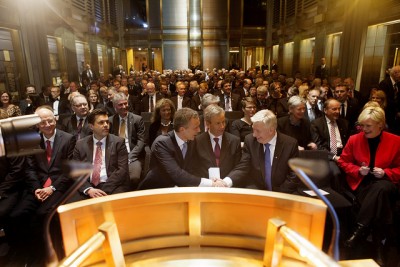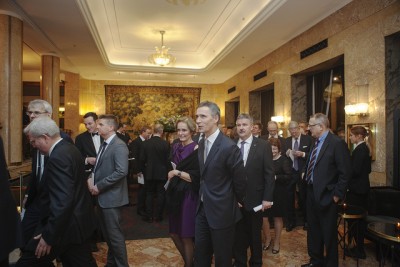Norway’s strong economy and disciplined approach to the management of its oil wealth didn’t stop the boss of the country’s central bank from sending out warnings instead of Valentine’s Day greetings on Thursday. Øystein Olsen told the country’s government and business leaders in his annual address that even though the offshore sector continues to boom, he’s worried about declining productivity in the depths of Norway’s mainland economy.

Olsen, whose formal title is governor of the central bank (Norges Bank), seemed as reluctant to celebrate or praise the country’s ongoing economic strength this year as he was last year, when he called for specific reductions in how much oil money is pumped into the economy every year. Olsen used the occasion of the central bank’s annual gathering of the country’s most powerful people to warn once again that Norway’s oil wealth may not last forever, and that the country needs alternative sources of economic growth.
“Our increasing dependence on oil and gas increases the vulnerability of the Norwegian economy,” Olsen said. “We know that neither of these sources will spring eternal.”
Olsen did acknowledge that despite years of such concerns, Norway has managed to avoid the economic misery facing so many other countries, even those that have oil resources of their own. The economy “is still growing and unemployment remains low,” Olsen noted, quickly adding, though, “there is a tendency to see ourselves as a country apart.” He doesn’t want anyone to be lulled into thinking the good times will automatically keep rolling, and instead was keen to offer tips about how government and business can “enhance the resilience of the Norwegian economy.”

The bank chief’s speech was, as usual, detailed and lengthy (external link), covering both regional, international and national issues from effects of the finance crisis to its evolution into what Olsen called a “sovereign debt crisis” with Europe at the center of it. He sees signs of improvement, but economic contraction has led to social unrest that’s spreading, with unemployment in many European countries at “alarming” levels.
Norway’s economy has remained strong, aided not least by demand for its main exports and now, also, resurgent equity markets. Norwegian media, however, picked up especially on one of Olsen’s major concerns: Norwegians, he feels, need to work more hours than they do now. Even though labour force participation is high in Norway and most job seekers find work, the working day is shrinking, he said, and the employment ratio – an expression of average labour input per hour worked among the active population – was higher in Greece than in Norway until Greece went into its deep crisis. Olsen said total labour input is also “considerably higher in Sweden, Finland and the US than in Norway. We work less than the OECD average.”
This can spell trouble in the years ahead, Olsen warned. High income growth “naturally” leads to a great preference for leisure, illustrated by how seriously Norwegians take their holidays, and Olsen noted that labour immigration has offset the downturn in working hours in Norway. He cautioned, though, that “this situation does not seem sustainable. Reforms that provide stronger work incentives are needed and should be implemented in anticipation of an ageing population.” He called Norway’s controversial pension reform measures, which indicate that many will need to work beyond the current official retirement age of 67 even to claim reduced benefits, “a step in the right direction.” He declined to suggest other specific measures, leaving that up to the politicians.

Olsen also worries that overall growth in mainland (non-oil-based businesses) productivity has declined since 2005. He noted that industries that don’t benefit from oil sector demand or public spending stagnated when the finance crisis hit in 2008. “The difference in growth across industries has widened since 2008,” he said, again highlighting the vulnerability of too much reliance on oil and gas.
The government, business and labour leaders listened to Olsen before they all headed for dinner at the Grand Hotel but few seemed alarmed by his warnings. “We have too many people working part-time and then we come out poorly in the statistics,” Roar Flåten, leader of Norway’s largest trade union federation, LO, told newspaper Aftenposten. “How much we work varies from branch to branch and hinges on family situation, but my impression is that Norwegian workers work a lot.”
Labour Minister Anniken Huitfeldt agreed that the high level of part-time workers in Norway “remains a challenge,” but believes the next generation wants to work full-time and efforts are being made to create more full-time positions, not least in the public health care system. “We also have too many people outside the job market,” Huitfeldt said, suggesting more emphasis on integrating them into the labour force.
Johan Andresen, one of Norway’s wealthiest investors and businessmen, said he didn’t think all of Olsen’s statistics were correct because of a rising tendency towards “flexi-time” and more Norwegians literally working around the clock, not just concentrated between the traditional hours of 8am to 4- or 5pm. He told Aftenposten he gets “a pile of e-mails” from colleagues working from home between 10pm and midnight, also on Sundays. “I think we compensate for what earlier would have been our time off,” he said, adding that there’s lots of volunteer work as well that creates value.
Most of Olsen’s guests on Valentine’s Day seemed in a festive mood heading into the annual dinner party afterwards that included king crab as a starter followed by a “Grand buffet.” And after months of preparation for his address, aided by a staff of experts and, according to newspaper Dagens Næringsliv (DN), no less than 11 rough drafts, even Olsen was probably hungry and ready for a break and arguably the most important part of the evening: Powerful mingling among the chief executive officers, directors, professors, economists, editors, investors, government ministers and Members of Parliament assembled.
Views and News from Norway/Nina Berglund
Please support our news service. Readers in Norway can use our donor account. Our international readers can click on our “Donate” button:

